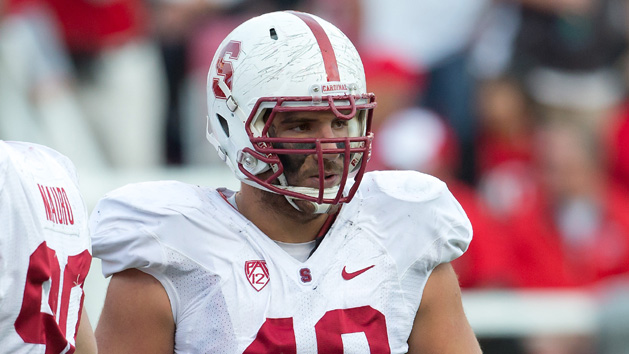
Stanford reclaimed its identity as a tough, talented defensive team in its 20-12 victory over Oregon State on Oct. 26, which parlays nicely into its bye week heading into its Nov. 7 showdown with Oregon.
However, the re-emergence of the Cardinal defense as a dominant force the past two games was mitigated by coach David Shaw’s announcement Tuesday that standout defensive end Ben Gardner will miss the rest of the season with a torn pectoral muscle suffered in the second half against the Beavers.
Gardner, a second-team all-conference selection last season, has 7.5 tackles for loss, including 4.5 sacks, is a fifth-year senior, so his college career is over. His absence will be noticeable, especially against the Ducks.
Gardner is the No. 18-rated defensive end prospect and No. 99 overall for 2014 by NFLDraftScout.com.
Stanford must hope Henry Anderson, the other starting defensive end who missed the last six games with a leg injury, is able to return against the Ducks. He is questionable for that game.
“We’ve got time to dial down for a few days and then get it ramped up,” Shaw said. “We’re going to take Thursday and Friday off just to get our bodies refreshed.”
Stanford is, first and foremost, a tough, smart defensive team that makes the plays needed to win close games. Stanford does not have the style or weapons on offense to put up a ton of points, which means blowouts are rare.
But Stanford makes the plays when they needed to be made. The Cardinal defense forced Oregon State quarterback Sean Mannion into four straight incompletions after the Beavers had a first down at the Stanford 7-yard line in the closing seconds of the game. It gave Stanford its second win in three games decided by a touchdown or less this season, and the Cardinal is 10-3 in such games since the start of last season.
Oregon State had scored at least 33 points in every game this season before being limited to 12 by the Cardinal, who won despite scoring just 20 points.
“Their whole front seven is old and good,” Oregon State coach Mike Riley said, “and they use their experience wisely. They not only played us well physically, but played a very smart game.”
Stanford must live up to that low-scoring, defense-first identity when it faces the Ducks at Stanford. The Cardinal played that role perfectly last season when it beat Oregon 17-14 in overtime in Eugene, Ore.
Stanford has five extra days to come up with a defensive scheme to slow the Ducks’ hurry-up attack that averages 55.6 points and has scored at least 42 points in every game this season. The Ducks have scored at least 34 points in 34 straight games, with one notable exception — the loss to Stanford last year when it managed just 14 points in four quarters and an overtime period.
In the meantime, Stanford has time to contemplate its status as a national-title contender.
Stanford is No. 5 in the BCS standings released Oct. 27, Stanford would improve its chances significantly by beating Oregon. Not only would it boost the Cardinal in the polls, but a win over the highly touted Ducks would improve Stanford’s standing with the BCS computers.
To win that game, Stanford needs an efficient performance from quarterback Kevin Hogan, who has had subpar performances in three of the past four games. He passed for just 88 yards against Oregon State’s mediocre pass defense.
